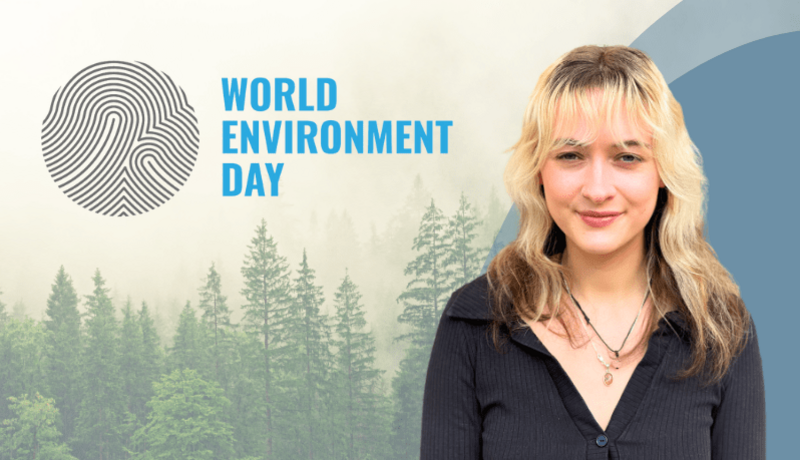Personal Perspective | World Environment Day with Lucy Warren
Posted on June 2023

For World Environment Day, we heard from Lucy Warren, our Birmingham D&I Ambassador, about some of the issues facing the environment, and the small steps we can take to make a positive impact.
Ever since I was a kid I’ve always enjoyed being outside. In the last few years I’ve also experienced quite bad anxiety and found that just taking a walk or sitting in the fields near my house have helped me so much. Studies all over the world are proving how much being in nature can reduce blood pressure and stress hormones. Because of all this, I’ve become passionate about making people aware of how beneficial these natural spaces are and how important it is that we maintain them.
“360,000 tonnes of reusable clothing goes into landfills each year in the UK.”
A huge danger to the environment is waste and our materialistic culture. Fast fashion is a particular issue, and its impact has really come to light over the last couple of years. I’ve read that 360,000 tonnes of reusable clothing goes into landfills each year in the UK. One solution is being more conscious of what we’re buying, not looking for a one-off wear but thinking in terms of investment pieces, while charity shops are also a sustainable alternative for clothing. A great organisation working to solve this is Clothes Aid, which collects unwanted clothes and furniture to distribute across other charities that need them.
Another big part of the issue is how people dispose of waste; litter is everywhere and I’m shocked at how people can just chuck it on the street. Just the other day I saw two kids in the back of a convertible throwing their McDonalds rubbish straight out of the roof! Plastics only break down to a certain extent, and these small pieces called ‘microplastics’ end up in the ocean, then into the fish that are in the ocean, and finally it can be harmful to people if consumed. As well as plastic waste, microplastics also come from synthetic clothes and certain beauty products.
There has been positive movement, however, as some companies have developed vacuums which can remove microplastics from beaches and repurpose them. The World Wide Fund for Nature also have a Plastic Smart Cities initiative in which they’re encouraging cities to sign a declaration to say that they will have zero plastic leakage into nature, and they already have several cities signed up.
“Something as simple as litter picking is a small thing that anyone can do to make a big difference to their area.”
The issue can be overwhelming and it’s easy to think, ‘What can I do?’ But I’ve noticed small things that give me hope. I live on a little estate with a patch of woods in the middle, and when I take my dog there a couple of times a week, I see there’s always a fresh carrier bag on the hook of a tree for people to put their waste in. I love that one of the neighbours has noticed the lack of facilities available and actively done something to look after the space. Something as simple as litter picking is a small thing that anyone can do to make a big difference to their area.
There are a lot more zero-waste food stores popping up where you can take your own containers along to fill them up; there’s one that’s only a ten-minute walk from our office! There are also Farmers’ Markets everywhere which don’t package their products in the wasteful ways that supermarkets do. With the current cost-of-living crisis, supermarkets aren’t even the cheaper option anymore; for example, you can go to a local Farmers’ Market and buy a huge tub of fruit for only a pound. It’s also a matter of thinking about what you’re buying; can I buy vegetables loose rather than packaged? Can I find an item second hand? There are also an increasing number of water filling stations popping up everywhere, so you can plan ahead instead of buying bottled water.
Big corporations hold great ethical responsibility to look at how sustainable their production and processes are; I found out that just 100 companies across the world create 71% of all greenhouse gas emissions. But we have a large responsibility as consumers too, if we’re not putting on pressure then they’ll carry on doing things as they always have been, but if people stop buying their products, they’re forced to listen and make a change.
Recent Articles
-
Flipping the Script on Islamophobia | Personal perspective | Nadia Muzaffar
Conversation is a powerful tool. Even a two-minute chat can change a perception, correct a misco...
28 days ago -
Pancreatic Cancer Awareness Month | Personal Perspective | Louise Francis
This year, our Birmingham office chose to fundraise for Pancreatic Cancer UK in support of my br...
about 1 month ago -
Personal Perspective| Islamophobia Awareness Month with Safiyyah Ayaz
For Islamophobia Awareness Month, we are honoured to feature passionate employees who have chosen...
about 2 months ago